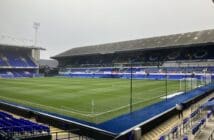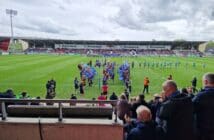When people think of football in Rotterdam, Feyenoord will be the most recognisable, with Sparta Rotterdam often mentioned. However, the little known Stichting Betaald Voetbal Excelsior or simply, Excelsior is a key part of the city’s football culture.
Excelsior were officially founded in 1902, almost 118 years ago, in the Kralingen area of Rotterdam. It was thought that football in this region can date back to the 18th century, where the original founders were already participating in their own friendly matches.
Despite originating in a wealthy area of the City, Excelsior were thought to have been one of the first working-class clubs in the country. At the time the club was founded, in the 20th century, Football was the sport of the upper classes unlike in Britain.
Roodzwarten (red-blacks), play their fixtures at one of the smallest stadiums in Dutch professional football: Stadion Woudestein. Known as the Van Donge and De Roo Stadion for sponsorship reasons, it has an unusual artificial turf, with a capacity of only 4,500.
Even though the club was founded very early in the global game’s journey, it took 44 years for the club to have any real success. Roodzwarten achieved promotion to the Eerste Klasse, which is equivalent to Eredivisie before Football became a professional sport in the Netherlands; remarkably, the deciding fixture was watched by a crowd of over 50,000 fans, unimaginable compared to today’s attendances.
Excelsior were the front runners in terms of the economic progression in Dutch Football, as they led the revolution into the professional game. It was the chairman of the mid-fifties, Henk Zon, who was the perennial figure in convincing the KNVB to allow clubs to pay their players a salary.
Just before the professionalism movement occurred, they gained their second promotion to Eerste Klasse in the 1951-52 season. The club had only previously spent one year at Dutch footballs most elite level, being relegated straight back down, after the initial promotion of 1946.
At the time, the Eerste Klasse was contested between 56 teams, split between four divisions. Excelsior managed some decent finishes, but never troubled the national playoffs and were eventually relegated to the Eerste Divisie in 1956.
There was a huge variation in finishes to come, with second place in 1992 the most impressive. However, the 1964-65 season was a dark year in the club’s history, with relegation to the Tweede Divisie occurring.
Excelsior started a rise in fortunes in the 1968-69 season, gaining promotion under manager Bob Janse. Janse would end up managing the Rotterdam club three separate times and remained a staunch supporter all of his life.
They gained back to back promotions rising to the heights of the Eredivisie, where they stayed until 1973. Excelsior fans weren’t to worry, as they gained their first silverware, winning the Eerste Divisie the season after.
Excelsior have reached the semi-final of the KNVB Cup twice in their history and reached the final once, losing one-nil to Feyenoord. They have, however, won the coveted Zilveren Bal trophy, which is most prestigious in the Netherlands.
Oud papier-club (Paper recycling club), made another very futuristic move in 1974, becoming the first team in Holland to have a sponsor on their shirt. Their shirts were adorned with a big “A”, which stood for Akai, a Japanese electronics country. This was banned by the KNVB until 1982, which was the season advertising on shirts become legal.
Excelsior have won the Eerste Divisie on three separate occasions, in the aforementioned 1973-74 season, 1979 and 2006. The Kralingers have gained promotion five times in 1970, 1982, 2002, 2010 and 2014.
Although resented by fans, there is a strong partnership between Feyenoord and Excelsior, which started in 1979. Excelsior have long been a feeder team for Feyenoord, providing their best talents and playing opportunities for younger players, to their bigger neighbours.
Some of these include Michel Bastos, Solomon Kalou, Royston Drenthe, George Boateng and most notably, Robin Van Persie.
Van Persie was born in Rotterdam and grew up in the area surrounding Excelsior. He joined the youth academy at the age of five but left to join Feyenoord at 16, after falling out with the Excelsior coaching staff.
Dutch football is known for its eccentric and dangerous ultras, but in a Rotterdam derby in 2018, Excelsior fans showed their big hearts. They threw soft toys into a stand housing children from one of the city’s hospitals. A lovely act of kindness in what could’ve been a very tense atmosphere.
Excelsior now lie 12th in the Eerste Divisie. The club were in Eredivisie up until the 2018/19 season, but were relagated back to the division they have spent most of their history.
With a new stadium on the horizon, possibly with new investment and the ability to hold on to their best players, Excelsior can start to make their own mark on Dutch football. They may be the minority in their city, but they are loyal, and progression is not out of their reach.
Follow us on Twitter @ProstInt
[columns]
[column size=”1/2″][blog type=”timeline” posts=”10″ cats=”35″ heading=”Netherlands” heading_type=”timeline” /][/column]
[column size=”1/2″][blog type=”timeline” posts=”10″ cats=”1072″ heading=”News” heading_type=”timeline” /][/column]
[/columns]
![Prost International [PINT]](https://prostinternational.com/wp-content/uploads/2021/08/PINTtFontLogoRoboto1536x78.jpg)



